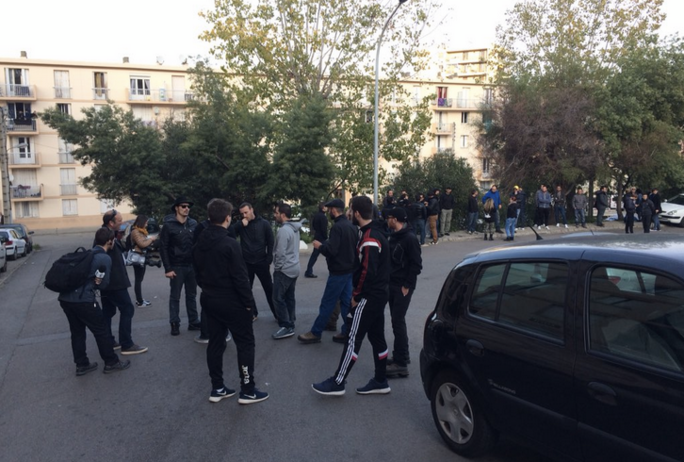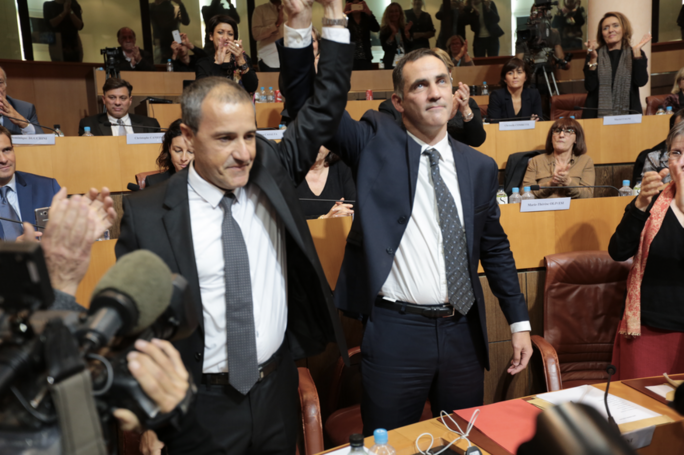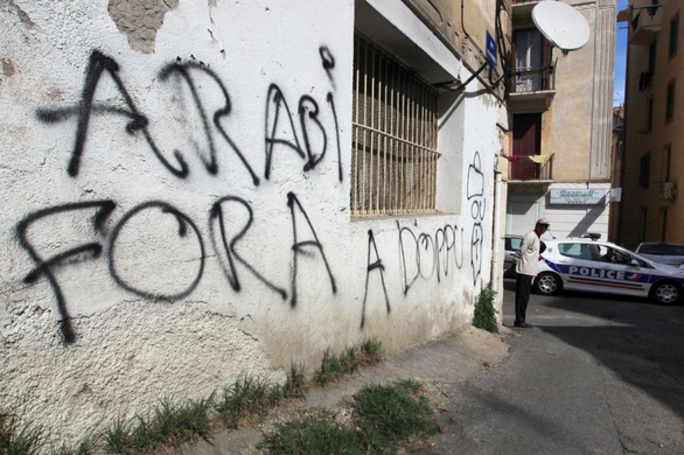“We have a big problem in this country and Corsica is a sad illustration of this,” said Laurent Marchangeli, mayor of the Corsican capital Ajaccio, speaking after a mob shouting racist slogans on Friday attacked a Muslim prayer room in the town and tried to burn copies of the Koran. “A strong hate, fanned by radicalized minds and also by politicians, threatens our unity. It lays claim to a land that is exclusively Christian, and condemns what is supposedly a rampant Islamisation of French society.”
The sequence of events began on Thursday night after what deputy-prefect François Lalanne said was a deliberate ambush of firefighters called out to extinguish a fire lit for the purpose at a site on the Jardins de l'Empereur estate, a housing-estate neighbourhood with a large population of North African origin. The official said two firefighters were injured when the windows of their truck were smashed by “hooded” youths. When police reinforcements were called out, one officer was also hurt in the ensuing violence. Lalanne said baseball bats, golf clubs and a bottle containing acid were seized, although no arrests were made. Citing “people close to the firefighters”, local daily Corse-Matin reported that some of the youths shouted “Dirty shitty Corsicans, get out of here, you are not at home here.”
The following day, December 25th, about 600 people gathered for a demonstration in front of the prefecture in support of the injured firefighters and police officer. A group, reportedly between 250- and 300-strong, then broke away from the protest to attack the housing estate. A local councillor, Paul Leonetti, said he was leaving a meeting he had attended nearby when “I found myself facing a crowd who were clearly spoiling for a fight”.
Les corses scandent " Il faut les tuer " pendant l'attaque de la salle de prière musulmane #Ajaccio pic.twitter.com/XbKRWrNACQ
— Nacéra (@NasNacera) 26 Décembre 2015Media reports said members of the vigilante mob were heard shouting in Corsican dialect “Arabi fora” - meaning “Arabs get out” – as well as, in French, “we’re at home here” and “We’re going to kill you”.
After trying to enter buildings on the estate to seek out the youths involved in the initial events on Thursday evening, some of the mob then went on to ransack a nearby Muslim prayer room and set fire to copies of the Koran. The terrace of kebab restaurant was also damaged.
Jean-Guy Talamoni, a leading member of the Corsican independence movement Corsica Libera, who was elected in regional elections earlier this month as president of the Corsican assembly, denounced the December 25th attack as “indescribable acts in a land which has instituted religious tolerance since the 18th century”. Meanwhile, Gilles Simeoni, member of the parallel independence movement, Inseme per a Corsica, who this month became head of the Corsican Executive Council, the highest local government body, condemned the vigilante mob for “racist acts” that were “completely contrary to the Corsica that we want”.
The sprawling housing estate, the Jardins de l'Empereur, has a population of about 3,000 and stands on the higher ground overlooking Ajaccio, a town of 65,000 inhabitants situated on the west coast of the French Mediterranean island. It is plagued by a higher-than-average unemployment rate, and a history of drugs trafficking, prompting comparisons with hundreds of low-income neighbourhoods of housing projects across mainland France, mostly situated in urban suburbs. Dubbed les banlieues - literally, “the suburbs” – these neighbourhoods have become synonymous in France with the economic and social exclusion of a disenfranchised youth of immigrant origins, lawlessness and high tensions.
But Christophe Mirmand, the prefect of Corsica (the senior civil servant who is the highest representative of the national administration), insisted that the Jardins de l'Empereur quarter in Ajaccio has little in common with the ghetto-like banlieues on the mainland. “There are a few acts of incivility, but never anything very serious,” he said. “This is not [like] the [highly sensitive] quarters of North Marseilles, one mustn’t caricaturise.”

Enlargement : Illustration 2

The principal objective of the mob involved in Friday’s revenge attack appeared to be to seek out the youths who were involved in the violence against the firefighters and police on Thursday night. “They thought they knew the addresses of the aggressors,” said prefect Christophe Mirmand. “I called up a certain number of [police officers] to avoid direct confrontations. The police stopped certain people from penetrating buildings, but there were insults shouted up from under the windows of apartments.”
It was after the situation on the estate was brought under control, and tensions subsided, that some of the mob headed off towards a nearby prayer room.
“It is a discreet prayer room, without any particular signs,” said Mirmand, which appeared to indicate that the group of an estimated 100 people knew exactly what they were looking for. A closed metal shutter outside was forced open and the prayer room was ransacked while copies of the Koran and prayer books were thrown into the street before an attempt was made to burn them.
“The events happened quite rapidly,” said Mirmand. “There was not, at that moment, a police presence in the area because the priority was given to the Jardins de l’Empereur,” continued the prefect, adding that there were fewer police available because of the holiday period. “And then, we are in Corsica. Here we don’t have the manpower of the prefecture in Paris.” The disturbances ended at about 9p.m.
While racist acts, and notably those targeting Muslims, are on the increase across France, the context in Corsica is a very particular one. Earlier this month, following nationwide regional elections across France, the independence parties Femu a Corsica and Corsica Libera formed an alliance to lead Corsica’ assembly – roughly equivalent to a regional council. In the runnup to the elections, Corsica Libera, explained its policies on immigration, under the phrase, in Corsican, “Populu è immigrazione : qui simu in Corsica” meaning “People and immigration: Here we are in Corsica”. Writing in the island’s newly-launched monthly magazine In Corsica, the Corsican author and translator Marcu Biancarelli says the phrase “echoes the old slogan of French Algeria – ‘Here, it is France’, picked up in the 1980s by the [anti-independence] CFR party and then these last few years by the [far-right] Front National with the recurrence we know of”.
Corsica Libera party leader Jean-Guy Talamoni, the new president of the island’s Assembly, identifies economic immigration as a problem that the island, with an average unemployment rate of 11% across its two départements (counties), cannot support much longer. He dismisses any common ground with the French far-right Front National party, but some of his policy statements share common ground with it and are picked up by extremist groups (including Vigilance nationale corse, Sangue Corsu, Cristiani Corsi) in order to justify racist and xenophobic acts under cover of nationalism. Some from the far-right, such as Estelle Massoni, founder of the Corsican branch of the Front National’s youth movement before this year joining Femu a Corsica, are attracted to the independence movement’s ranks.
Mob heard shouting 'Dirty Arabs, show yourselves!'
When Jean-Guy Talamoni was sworn in as president of the Corsican Assembly on December 18th, he gave an eight-minute speech in the Corsican dialect, prompting commentators on mainland France to announce the return of the “Corsica problem” as the nationalist movement and its demands have, for decades, been viewed from Paris.

Enlargement : Illustration 3

Sociologist Marie Peretti-Ndiaye, herself a native Corsican, is the author of a study of racism in Corsica, Le Racisme en Corse, published in France as a book last year. Asked by Mediapart whether racist behaviour in Corsica is linked to the nationalist movement, she warned that connection is far from straightforward. “At one time, it was thought in France that racism was uniquely nationalist, otherwise put, reserved for the far-right,” said Peretti-Ndiaye. “The association made between Corsican nationalism and racism seems to me to take root in this context. But what is called ‘nationalism’ comprises several potentials, for openness like for closure, in Corsica or elsewhere.”
The representative in Corsica for the League of Human Rights, André Paccou, insists that “you cannot suspect Jean-Guy Talamoni and Gilles Simeoni, who have never ceased to castigate far-right groups, of stirring this type of hate”, while he recognised that what he called “a form of permission” for xenophobic or racist acts may have been felt by some after the recent election victory of the independence movement parties. “The responsibility of our leaders consists from now on repeating that the victory of the nationalists in no way justifies xenophobic acts,” said Paccou. “There are wounds over national identity here that must not be left in the hands of dangerous people.” Paccous said the events in Ajaccio on Friday were not unpredictable. “It’s hardly a surprise because the calls of hate and incitation of violence have multiplied of late,” he said.
Ajaccio’s conservative mayor, Laurent Marchangeli, who is also a Member of (the French) Parliament (MP) for the Républicains party (former UMP), told Mediapart that he was “unfortunately not surprised” by the events. He said he had for months observed “hatred” mounting and had alerted the administration to the fact while watching out for “the spark that would start the fire”. He says the social media serve as his barometer, where he has observed what he called “a vomit” of comments, notably following the terrorist attacks in Paris in January and November.
He cited the case of one group, Vigilance nationale corse, which he insisted had “nothing to do with the nationalists” in power. “They’re everywhere,” said Marchangeli. “The day after [the Paris terrorist attacks on] November 13th they went to cause trouble on the Saint-Nicolas square in Bastia during the demonstration in homage to the victims of the Paris attacks and turned the tribute into a political meeting. They also had a go at me last September because I had placed the stadium at the disposition of the Muslim Association of Ajaccio for the Eid al-Adha festivities. We had to cancel everything because they promised to smash everything up.”

There have been other similar events through the year. In April, a Muslim place of worship in Propriano, a coastal town in the south-west of the island, was vandalized. In june, at Prunelli-di-Fiumorbu, a village in the centre-east of Corsica, the local primary school was forced to cancel its summer fete where pupils had planned to sing John Lennon’s Imagine in French, English, Spanish and Arabic. The teachers were rounded on after school hours by a number of parents unhappy that their children should sing in Arabic, and some threatened to disrupt the event. Meanwhile, the school walls were daubed with ‘Arabi fora’ (Arabs out) slogans.
In October, the leader of the far-right Ecologist Alliance, Jean-François Baccarelli, led a demonstration of about 150 people in Bastia opposing the arrival of migrants on the island. At the time, only one mayor in Corsica, the nationalist Jean-Félix Acquaviva, had offered to take part in the French government’s voluntary programme of rehousing migrants arriving from European transit camps.
Following the events of December 25th, the French government condemned both the ransacking of the Muslim prayer room and the preceding attacks against the firefighters and police that set off the train of events. In a message sent out on Twitter, Manuel Valls wrote: “After the intolerable aggression against firefighters, the inacceptable profanation of a Muslim place of prayer. Respect for republican law. Meanwhile, interior minister Bernard Cazeneuve declared that “these intolerable exactions, which smack of racism and xenophobia, will not be allowed to go unpunished, such as they violate the very values of the [French] republic.” He also condemned “with the greatest firmness” the attacks on the firefighters and police the night before.
But these were simply the “squealings of Twitter” for Marwan Muhammad, an author and statistician who is a former spokesman for the Collective against Islamophobia in France. “The speeches of the government these past weeks have freed-up racist talk, in a de-complexed manner, like the stripping of [French] nationality [from bi-nationals guilty of terrorist crimes] which connects to the idea that there are two [types of] French people, those of indigenous stockand the others. […] The public authorities play up to being transfixed by the Corsican extremists while, since the state of emergency, they smash open doors and place innocent Muslim families under house arrest.”
“This attack on a mosque [sic] in Corsica is the symbol of all the real violence, and symbolic of what it is to be a Muslim in France today,” Muhammad continued. “Among the ranks of the ‘parents’ generation’, which is not engaged, politicized, it has brought back the period of racism with no complexes of the 1960s and 1970s. He said there had been a change since the January terrorist attacks in Paris and those of November in that now “it is the complicity of the government that feeds the ambient climate of Islamophobia”.
The Muslim population in France, estimated to number five million people, is the largest in Europe. According to the French National Observatory Against Islamophobia (ONCI), there were 274 acts and threats targeting Muslims in France during the first quarter of 2015, representing a year-on year rise over the same period of 281%. The ONCI, a branch of the French Muslim Council, based its figures on complaints lodged with the police and gendarmerie and subsequently transmitted to the public prosecutor’s office. “But very few of these acts of discrimination or violence against institutions and people result in arrests and trials,” said Marwan Muhammad.
On Saturday and Sunday, the demonstrations in Ajaccio protesting the Christmas Eve attack on the firefighters and police continued, depleted by Sunday to a gathering of about 200 people in front of the prefecture building. The police, using a street-wide plastic fence behind which was posted a riot squad, blocked access to the the Jardins de l'Empereur estate. The police deployment was more effective than on Saturday, when a larger gathering of about 300 people managed to break into the estate. Local TV channel France 3 reported that some were heard chanting “Dirty Arabs, show yourselves”, while one journalist for rolling TV news channel i-Télé reported on Twitter: “Fire crackers, slogans, tags, Bloody shitty Arabs come on out, shout the demonstrators.”
-------------------------
- The French version of this article can be found here.
English version by Graham Tearse


